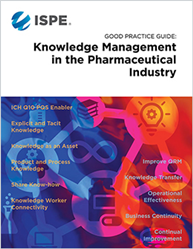
Employing Knowledge Management methods and tools enables organizations to better manage their knowledge as a key asset, in turn improving the effectiveness of the pharmaceutical quality system, providing operational benefits and more.
NORTH BETHESDA, Md. (PRWEB)
May 20, 2021
The International Society for Pharmaceutical Engineering (ISPE) announced the release of its latest Guide, ISPE Good Practice Guide: Knowledge Management in the Pharmaceutical Industry. The Guide focuses on how Knowledge Management (KM) can enable a more effective Pharmaceutical Quality System (PQS).
The first such guidance in the pharmaceutical industry, the Guide promotes uniting KM with Quality Risk Management (QRM) to enable better risk-based decisions. It shows how KM can enhance nearly every element of the PQS across the product lifecycle.
“Knowledge Management focuses on how organizations create, manage, and use knowledge throughout the lifecycle of a product. It, along with QRM, is one of the two enablers of an effective Pharmaceutical Quality System as defined by ICH Q10,” said Paige Kane, Guide Team Co-Lead, Director Knowledge Management, Merck & Co., Inc. (Rahway, NJ USA). “Employing KM methods and tools enables organizations to better manage their knowledge as a key asset, in turn improving the effectiveness of the pharmaceutical quality system, providing operational benefits and more.”
“There are currently few resources, and no industry guidance available which address the role of Knowledge Management specifically for the pharmaceutical industry. This guide works to demystify KM and provides practical guidance, templates, case studies, and references to related ISPE industry guidance to help organizations better understand what KM is, the benefits of effective KM, and how to deploy KM,” said Melanie Byrne, Guide Team Co-Lead, Knowledge Management Lead, Pfizer.
This Guide was written and reviewed by a group of experts in the field, making it a must-have reference to improve your capabilities in managing knowledge and using that knowledge to support an effective PQS resulting in improved PQS outcomes (e.g., better risk-based decision making).
Beyond the quality system, substantial and compelling benefits of effective KM include improved business performance by increasing efficiency, building more robust processes, facilitating continual improvement and creating an engaged knowledge workforce.
Purchase the ISPE Good Practice Guide: Knowledge Management in the Pharmaceutical Industry online, available at ISPE.org/Publications/Guidance-Documents, among ISPE’s other detailed education resources on a variety of industry topics.
About ISPE
The International Society for Pharmaceutical Engineering (ISPE) is a not-for-profit association serving its Members through leading scientific, technical, and regulatory advancement across the entire pharmaceutical lifecycle. The 18,000 Members of ISPE are building solutions in the development and manufacture of safe, effective pharmaceutical and biologic medicines, and medical delivery devices in more than 90 countries around the world. Founded in 1980, ISPE has its worldwide headquarters and training center in North Bethesda, Maryland, USA, and its operations center in Tampa, Florida, USA. Visit ISPE.org for more information.
For more information, contact:
Amy Henry
Director, Marketing and Communications
International Society for Pharmaceutical Engineering (ISPE)
Email: ahenry@ispe.org
ISPE.org
Share article on social media or email:

